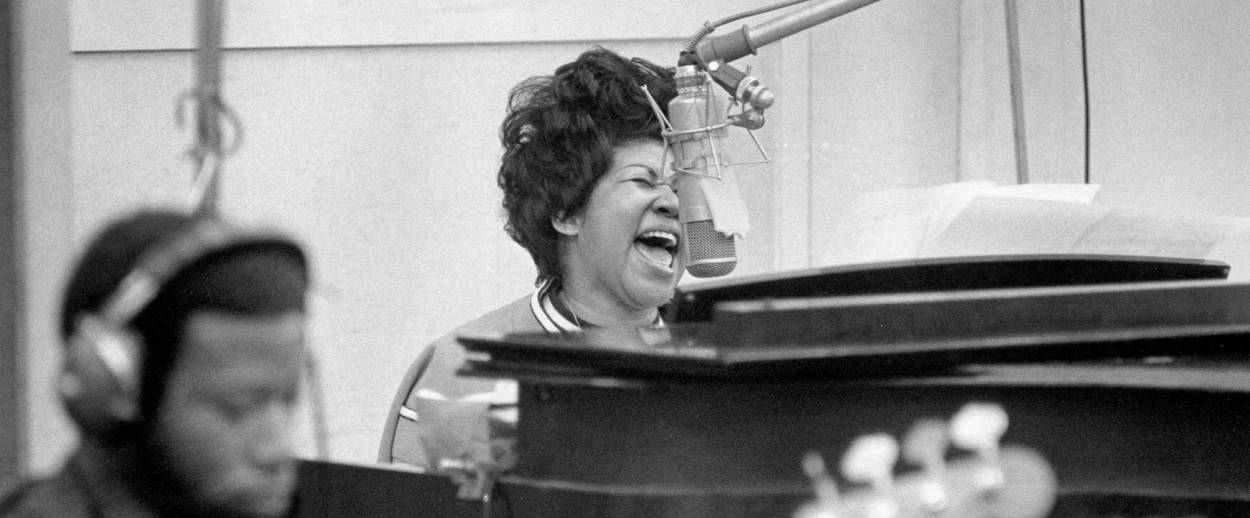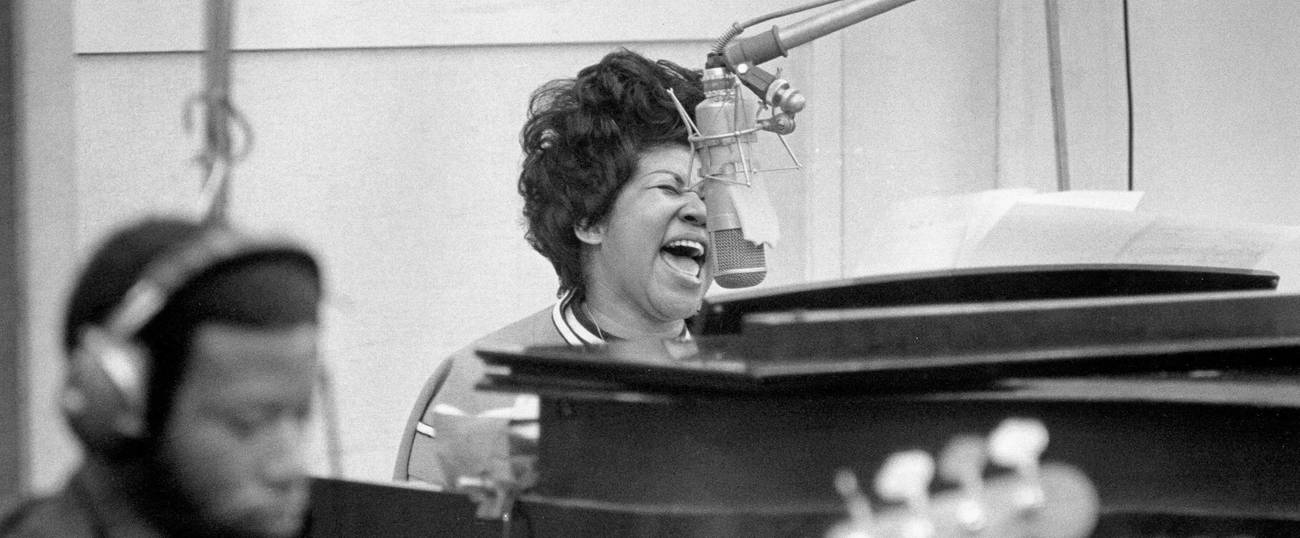Her Holiness
The spirit of Aretha Franklin, whose songs would shoot through the astral plane—and beyond




Aretha Franklin, who died Thursday at age 76, was the greatest singer in the history of popular music. She was not as foundational as Louis Armstrong or as technically impeccable as, say, Ella Fitzgerald or Sarah Vaughan. She wasn’t a vocal revolutionary, an innovator like Billie Holiday or Bob Dylan. But none of those titans, nor any of the other usual suspects—not Frank Sinatra or Elvis Presley or George Jones, not Franklin’s childhood mentors and vocal models Mahalia Jackson and Clara Ward and Dinah Washington, not her fellow travelers on the path from the black church to secular showbiz, Ray Charles and Sam Cooke—none of them had her almighty ability to make any song, whether a roiling gospel testimonial or a spry pop hit or a half-tossed-off Doobie Brothers cover, feel like a manifesto on the power and majesty of music itself, a disquisition that touched the most profound riddles of the universe.
To put it another way: Franklin’s singing embodied history and mystery. As obituary writers have dutifully explained, her music reflected, and helped to define, the big postwar American story, the sagas of civil rights, women’s liberation, Black Power. That history is subsumed in songs about everyday pleasures and pains: love, lust, parties, driving around in cars, romantic turmoil, personal integrity, and resiliency, and, of course, religious faith. She was, supremely, fearsomely, a diva. Yet her songs put on no airs. “Just call this song exactly what it is,” went a refrain in “Rock Steady” (1972)—a realist’s credo.
When she opened her mouth and sang, though, her earthy, earthly songs levitated. History connected to cosmic mystery. Smokey Robinson once said of Franklin: “She came from a distant musical planet.” She sang with the wisdom and authority of someone who seemed to survey the world from a great height. She would sit at a piano, spilling out gospel chords, and her songs would shoot to the top of cathedral clerestories and beyond, zooming up to the astral plane.
I’m not the first writer who has confronted the puzzle of Aretha Franklin by throwing bombast at the problem. The rock critic Robert Christgau once wrote of Franklin’s voice: “No one has satisfactorily described it in words.” It would take a more musically astute person than I, and possibly a new system of notation, to map the effects—the minute fluctuations of tone and timbre, the rhythmic play and variations in attack, the way her gleaming upper register is clouded momentarily by shades of grit and then streams clear again—which make songs like “(You Make Me Feel Like) A Natural Woman” and “Ain’t No Way” such emotional blockbusters. The shorthand is simply “soul,” the term given to the blend of sacred gospel and secular rhythm and blues pioneered by Franklin, Charles, Cooke, and others. The word conveys the profundity of Aretha’s music, the sense that it emanates from a place of depth and beauty.
But “soul” has also created confusion about the nature of Franklin’s greatness, with many commentators, white ones especially, resorting to racial mysticism, picturing Aretha as a conduit of an exotic, essentialized blackness. (A 1970 Rolling Stone review judged Franklin’s music to “possess a kind of soul freakishness.”) The truth of the matter was more mundane and more impressive: Franklin was a magical musical professional. Aretha’s father, Rev. C.L. Franklin, was a famous Baptist minister with cosmopolitan leanings; the Franklins’ Detroit home was a magnet for musicians, and Aretha grew up surrounded by the crème de la crème of gospel and jazz. She swallowed all that music whole; before she was a teenager, she sang and played piano so well that it was clear to all she was a prodigy, “the next one,” in Dinah Washington’s forecast.
Franklin’s gifts included not just nebulous “soul,” but outrageous chops and superlative musical intelligence. You can hear the breadth of that talent on early tracks like “Nobody Like You” (1962), from Franklin’s third album for the Columbia label. The song was envisioned by producer John Hammond as discreet cocktail jazz, but Franklin takes it to different place. Her piano playing grounds the song in gospel ballast, and her vocal hangs behind the beat, dramatizing a jilted lover’s bewilderment. The pathos she wrings from the song may have been informed by her own experiences. Franklin became a mother at age 12 and had her second child when she was 14; by the time she recorded “Nobody Like You,” at age 19, she’d already lived a life. But the performance is above all a testament to control and craftsmanship, a masterful musician thinking and feeling her way toward a commanding personal style.
Her genius flowered in the late 1960s when she made the switch to Atlantic Records. What followed was the most storied album run in the most storied album decade in pop history: I Never Loved a Man the Way I Love You (1967), Lady Soul (1968), Spirit in the Dark (1970), Young, Gifted and Black (1972), Amazing Grace (1972), to name just the indisputable masterpieces. These recordings made Franklin a megastar. To put the matter bluntly: No black woman had achieved such pop success, and no female pop superstar had been so manifestly black—such an uncompromising representative of black musical aesthetics, black politics, “black is beautiful.” Franklin’s racial pride was displayed in both her substance and her style, in her hair and clothes, and in the regal, imperious bearing that made “Queen of Soul” an apt honorific. Much has been written about the politics of her music: how records like “Respect,” on the surface a lover’s plea for sexual satisfaction, encoded messages of black and feminist emancipation. But ultimately Franklin’s politics lay less in what she said than the way she said it: in the indomitable power of her performances, which forced all honest observers to grapple with the reality that the world’s greatest living artist, in any medium, might well be an African-American female popular singer.
It’s worth noting a neglected aspect of Franklin’s achievement: songwriting. Franklin was such a legendary interpreter of other people’s songs, snatching up not just Otis Redding’s “Respect” and Carole King’s “Natural Woman,” but dozens more contemporary hits and standards of past eras, that her skill as a composer is sometimes overlooked. But what songwriter would care to put his catalog up against “Rock Steady,” “Call Me,” “Day Dreaming,” “Think,” “(Sweet Sweet Baby) Since You’ve Been Gone”? One of my favorites is “First Snow in Kokomo” (1972), Franklin’s tender, funny chronicle of a day on the road with her touring band, which flows out on an almost meandering harmonic course, following its own dreamy logic. Then there’s the song that ranks with the greatest Franklin ever recorded, “Spirit in the Dark” (1970). It builds from a piano-and-voice opening to a propulsive 12-bar bridge that finds Aretha belting curious lyrics over a sequence of stop-times:
It’s like Sally Walker, sittin’ in a saucer
That’s how you do it, ain’t nothing to it
Rise, Sally, rise
Put your hands on your hips
And cover your eyes
And move with the spirit …
Move with the spirit in the dark
These lines paraphrase a famous nursery rhyme and wink at “Mustang Sally.” But something stranger, eerier, is afoot: “Rise, Sally, rise/Put your hands on your hips/Cover your eyes.” What exactly is Franklin evoking? Dancers grooving on a packed floor? Lovers in a boudoir? Is she describing a spiritual passage, an ascension from this life to a shadowy realm beyond? Does that phrase “spirit in the dark” refer to communion between human beings, or to the Holy Ghost? Or is the song about all of the above—music, dancing, sex, death, God?
The answer, like so much about Aretha, cannot be pinned down. What I do know is that those words, blasted out by Franklin over bustling syncopations from bass, drums, piano, organ, and hooting backing vocalists, form a work of art as glorious and profound as, well, whatever you got: Psalm 18, Sonnet 55, Symphony No. 9, you name it. What’s more, the lyrics, slightly tweaked, can serve as a pretty good user’s guide to Aretha Franklin. Put on her records, cover your eyes. If you’re sentient, you’ll get the spirit.
***
Like this article? Sign up for our Daily Digest to get Tablet Magazine’s new content in your inbox each morning.
Jody Rosen is a contributing writer for the New York Times Magazine.